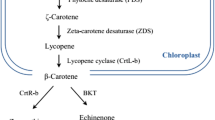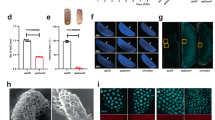Abstract
THE study of the control of DNA synthesis would be helped if a variety of chemicals which influenced DNA synthesis in various ways was available. We have searched for chemicals which prevent mitotic division of sea urchin embryos, which requires DNA synthesis, but do not prevent meiotic divisions of starfish oocytes, which are independent of DNA synthesis1. Aphidicolin2 (I) is one such compound. Furthermore, recent experiments have shown that aphidicolin selectively inhibits the activity of DNA polymerase-α obtained from regenerating rat liver without interfering with the activity of DNA polymerase-β and mitochondrial DNA polymerase3. The function of the DNA polymerases in the complex process of DNA replication is not known. Correlative studies of DNA synthesis and the level of DNA polymerase activity suggest that DNA polymerase-α may be important in DNA replication4. However, in certain cases, DNA polymerase-β and -γ also increase at the time of DNA synthesis, and attempts to specify which of the DNA polymerases is ‘replicative’ or to assign roles to the various polymerases have not yet been successful4. We report here evidence that prevention of cell division by aphidicolin in sea urchin embryos is due to selective inhibition of DNA polymerase-α activity. This study implies a functional role for this polymerase activity during replication of DNA.
This is a preview of subscription content, access via your institution
Access options
Subscribe to this journal
Receive 51 print issues and online access
$199.00 per year
only $3.90 per issue
Buy this article
- Purchase on Springer Link
- Instant access to full article PDF
Prices may be subject to local taxes which are calculated during checkout
Similar content being viewed by others
References
Zampetti-Bosseler, F., Huez, G. & Brachet, J. Expl Cell Res. 78, 383–393 (1973).
Dalziel, W., Hesp, B., Stevenson, K. M. & Jarvis, J. A. J. J. chem. Soc. Perkin Trans. I, 2841–2851 (1973).
Ohashi, M., Taguchi, T. & Ikegami, S. Biochem. biophys. Res. Commun. 82, 1084–1090 (1978).
Weissbach, A. A. Rev. Biochem. 46, 25–47 (1977).
Brachet, J. & Malpoix, P. Adv. Morphogenesis 9, 263–316 (1971).
Ikegami, S., Kamiya, Y. & Shirai, H. Expl Cell Res. 103, 233–239 (1976).
Mathews, C. K. Expl Cell Res. 92, 47–56 (1975).
Hinegardner, R. T., Rao, B. & Feldman, D. E. Expl Cell Res. 36, 51–61 (1964).
Mano, Y. Devl Biol. 22, 433–460 (1970).
Loeb, L. A. J. biol. Chem. 244, 1672–1681 (1969).
Suzuki-Hori, C., Nagano, H. & Mano, Y. J. Biochem., Tokyo 82, 1613–1621 (1977).
Author information
Authors and Affiliations
Rights and permissions
About this article
Cite this article
IKEGAMI, S., TAGUCHI, T., OHASHI, M. et al. Aphidicolin prevents mitotic cell division by interfering with the activity of DNA polymerase-α. Nature 275, 458–460 (1978). https://doi.org/10.1038/275458a0
Received:
Accepted:
Published:
Issue Date:
DOI: https://doi.org/10.1038/275458a0
This article is cited by
-
Subcellular localization of fungal specialized metabolites
Fungal Biology and Biotechnology (2022)
-
Spatiotemporal variation in cell proliferation patterns during arthropod axial elongation
Scientific Reports (2021)
-
Stability of cytoplasmic nanoviscosity during cell cycle of HeLa cells synchronized with Aphidicolin
Scientific Reports (2019)
-
Cell cycle inhibitors improve seed storability after priming treatments
Journal of Plant Research (2019)
-
Properties of LINE-1 proteins and repeat element expression in the context of amyotrophic lateral sclerosis
Mobile DNA (2018)
Comments
By submitting a comment you agree to abide by our Terms and Community Guidelines. If you find something abusive or that does not comply with our terms or guidelines please flag it as inappropriate.



